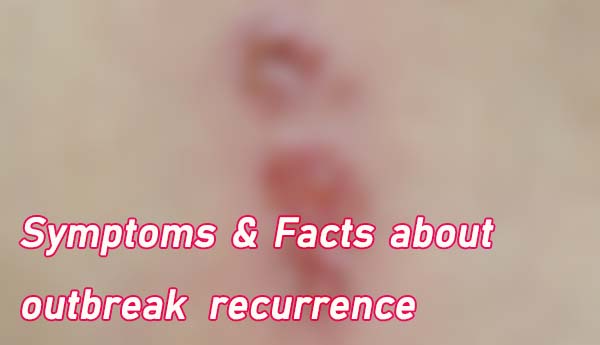Repeat herpes outbreaks: Herpes outbreak recurrence
What is an outbreak recurrence?
Most of the time when herpes symptoms are not present on the skin the virus remains in a latent (sleeping) state in the central nervous system, where it does no damage.

When the virus reactivates (wakes up) it travels nerve paths to the surface of the skin, sometimes causing what is known as an "outbreak" or episode of symptoms. Read more facts the cycle of a typical outbreak.
Recurrent Genital Herpes
If you have recently made it through a first episode that consisted of full-blown symptoms, you know something about signs and symptoms already. The good news is that the first episode is almost always the worst that HSV throws your way. Signs and symptoms of recurrent episodes (when they occur) tend to be milder and heal much more quickly, typically within two to twelve days.
If the first episode produced fairly mild symptoms, then subsequent recurrences will not usually increase in severity. But, as noted earlier, when genital herpes recurs after a first episode, it doesn’t always cause recognizable signs and symptoms.
Some people have recurrent outbreaks with the so-called "classic" blister-like herpes lesions that crust over, or with painful sores. In recurrent herpes, however, this process usually takes about half the time it does in first episodes. In addition, many people have very subtle forms of recurrent herpes that heal up in a matter of days. And lastly, herpes is capable of reactivating without producing any visible lesions (asymptomatic reactivation).
Much of the broad description of herpes "lesions" included above applies to recurrent herpes as well. Lesions may take the form of something resembling:
- a red spot
- a pimple
- an ingrown hair
- razor burn
- hemorrhoids
- insect bite
There’s quite a variety, in short. And while genital herpes certainly can and does cause these signs of infection literally on the genitals (the penis or the vulva) it also can produce signs of infection nearby. Herpes sores on or between the buttocks are common (and sometimes slow to heal), as are lesions on the thigh. Herpes can bring about what feels like a tiny fissure around the anus, something easily confused with hemorrhoids. So remember: recurring signs and symptoms in the genital or anal area could well be herpes lesions.
But what if you don’t see any lesions nor have other symptoms? In some studies, people with herpes were completely unaware of lesions about one-third of the time that the virus was found to be active in the genital area. While recognizing lesions and other symptoms is important, this cannot always tell you when the virus is active.
Have herpes & feel alone? Meet nearby people with herpes

PositiveSingles is one of the most popular dating websites for people suffering from herpes and other STD. It was initiated in 2001. With 1,510,800+ members you are sure to find lots of potentail people around you.
Join and meet nearby people with herpes, browse profiles and chat now!
When and where can outbreaks reoccur?
The first outbreak is normally the worst and many people do not experience a recurrence until months and sometimes even years after their first primary outbreak.
If and when a recurrence does happen it is sometimes related to a time when the immune system is weakened or under pressure, such as after an illness, during times of stress, due to a poor lifestyle, surgery, etc. In the case of cold sores, sometimes being in the sun can cause a recurrence. It is different for everybody. Read more about what triggers herpes outbreak.
During the body's first exposure to the herpes virus, the immune system develops antibodies and other weapons against the virus. During a recurrence, then, this "immune memory" can help to fight off infection more quickly.
As a result, as time goes on there are usually fewer sores, they heal faster, and the outbreak is less painful. Some people never experience another recurrence, which is often attributed to a strong immune system response.
Nerves can have many ‘axons' which is why the herpes virus can travel different pathways to your skin. This is why outbreaks may naturally appear in different areas “nearby” to one another.
However, each nerve has a particular area of skin that it serves called a dermatome. The herpes lesions are limited to the dermatome it initially infected unless you infect yourself somewhere else.
This means that the outbreaks are limited to the body area where the infection exists (for example, the genital area) unless you contract or spread the infection somewhere else.
The nerves in the genitals, upper thighs and buttocks are connected; therefore, in the case of genital herpes a person could experience outbreaks in any of these areas. Such areas include the vagina, vulva, penis, scrotum, anus, buttocks and thigh.
Although the above scenario is possible, if the virus reoccurs it typically surfaces in the same spot or directly nearby the ‘original' site of infection.
How often do outbreaks occur?
When the virus reactivates (or wakes up) it travels nerve paths to the surface of the skin, sometimes causing an "outbreak" or break out of symptoms. This will continue to recur depending on your immune system's control over the virus.
The number of outbreaks someone has varies from person to person. The average number of outbreaks for a person with genital HSV-2 is four to five per year. The average for genital HSV-1 is less than one outbreak per year.
Usually, there are more outbreaks during the first year, and many people find that outbreaks become less severe and less frequent with time.
Up to 80% of people who have a first episode caused by HSV-2 will have at least one recurrence.
Will I have a re-occurrence?
It is true that most people with herpes have a recurrence but there are many people who don't. If the symptoms do return, for most people they tend to be less and less severe as time goes on and as your immune system builds up antibodies. Herpes outbreaks are different for everyone. Even though it is the same virus, it could cause a particular symptoms in one person (such as mild itching and burning) and yet cause completely different symptoms in their partner (such as a small blister or even no symptoms at all). The typical frequency of a herpes outbreak is four times a year or once every three months. If a person has been infected with the herpes virus it does not necessarily mean that they will ever experience an outbreak or a re-ocurrence.
What triggers your herpes outbreaks?
Do you know what triggers your herpes outbreaks? Some of the following factors may trigger genital herpes symptoms. Contiune to read the factors that will trigger your herpes outbreaks or how to prevent herpes outbreaks. .
How long does a recurrent herpes outbreak last
Every case of herpe outbreak is different depending on the person. There are many factors that can alter the amount of time it takes a herpes outbreak to clear. Subsequent outbreaks are usually less severe and pass within a few days. Read more about how long does a reccurrent outbreak last.
How do you know when a herpes outbreak is coming?
The best way to know if herpes symptoms are sneaking up on you? Pay attention to your body. People commonly report feeling a slight burning, itching. For more facts, read how do you know when a herpes outbreak is coming. When you become more knowledgeable about your own body, you can pick up on signals of an impending outbreak. Then you can be pro-active and take your anti-viral medication to avert the outbreak altogether.
Have herpes & feel alone? Meet nearby people with herpes

PositiveSingles is one of the most popular dating websites for people suffering from herpes and other STD. It was initiated in 2001. With 1,510,800+ members you are sure to find lots of potentail people around you.
Join and meet nearby people with herpes, browse profiles and chat now!
Know more facts about herpes outbreak:
First herpes outbreak | Recurrent herpes outbreaks | Stages of a herpes outbreak | How long does a herpes outbreak last | How often do herpes outbreaks occur? | What can trigger herpes outbreaks? | How to recognize a herpes outbreak? | How to prevent herpes outbreaks | Viral shedding | Herpes treatment | How to strengthen your immune system
